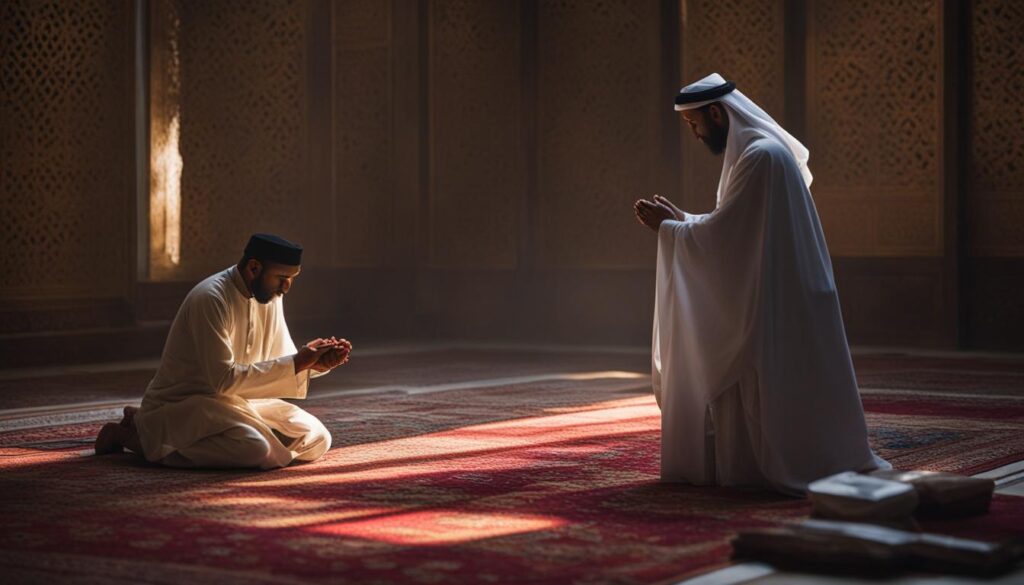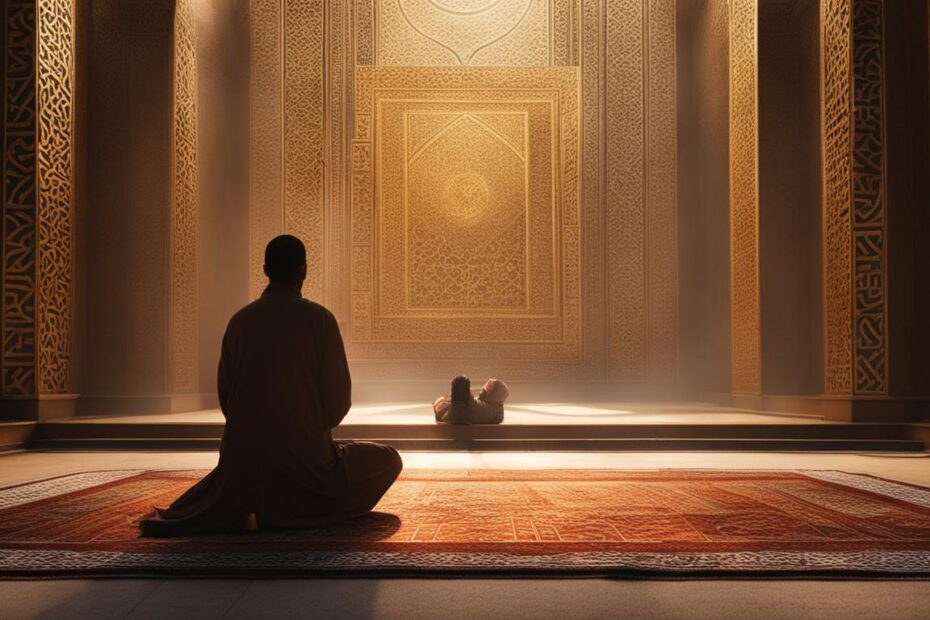In Islamic culture, prayer holds immense significance, acting as a vital pillar of religious practice. With over 1.2 billion Muslims worldwide engaging in daily prayer, it is a deeply ingrained tradition. Muslims perform prayer five times a day, finding solace, comfort, and guidance through this spiritual practice.
- Prayer is a religious obligation for Muslims, with over 1.2 billion people practicing it worldwide.
- Prayer serves as a means to alleviate personal worries and seek comfort and peace.
- Through prayer, Muslims connect with Allah and seek His guidance and assistance.
- Islamic prayer follows specific customs, rituals, and etiquette, including facing Mecca and performing ablution (wudu) before prayer.
- Prayer in Islamic culture offers numerous benefits, including spiritual connection, relief from pressure, and the opportunity to express love and gratitude.
Prayer Practices in Islamic Culture
Prayer in Islamic culture encompasses a rich set of customs, rituals, and etiquette that are followed with reverence and devotion. These practices guide Muslims in their daily worship and provide a framework for their spiritual connection with Allah. Here, we explore some of the key elements of Islamic prayer customs and rituals.
Islamic Prayer Etiquette
When engaging in prayer, Muslims are expected to adhere to specific etiquette. This includes facing the direction of Mecca, known as the qibla, which is the holiest city in Islam. Muslims also perform ablution, known as wudu, before prayer, which involves washing the hands, face, arms, and feet. This purification ritual prepares the worshipper for their spiritual connection with Allah.
Islamic Prayer Timings
Prayer timings hold great importance in Islamic culture. Muslims are required to perform five daily prayers, known as Fajr, Dhuhr, Asr, Maghrib, and Isha, at specific times throughout the day. These timings are determined by the position of the sun and are often printed in Islamic newspapers or can be easily accessed through online resources.
Islamic Prayer Techniques
Islamic prayer involves a series of physical movements and recitations. Muslims typically stand, bow, and prostrate during prayer, demonstrating their submission and devotion to Allah. Throughout the prayer, supplications, known as dua, can be recited, allowing worshippers to seek blessings, guidance, and forgiveness from Allah.
| Islamic Prayer Customs | Islamic Prayer Rituals | Islamic Prayer Etiquette |
|---|---|---|
| Performing ablution (wudu) | Physical movements and recitations | Facing the direction of Mecca |
| Reciting supplications (dua) | Performing prayers at designated times | Adhering to specific etiquette |
These prayer practices form an integral part of Islamic culture, allowing Muslims to establish a direct connection with Allah and seek His guidance and mercy. Through adherence to specific customs, rituals, and etiquette, Muslims strive to deepen their spiritual connection and find solace in the act of prayer.
Benefits of Prayer in Islamic Culture
Prayer in Islamic culture offers numerous benefits. It serves as a means of spiritual connection with Allah, providing individuals with a sense of peace, serenity, and relief from pressure. Muslims value prayer for its ability to grant them comfort and guidance in times of personal difficulties. Prayer is seen as an opportunity to express love, admiration, and longing for the Creator. It allows Muslims to seek forgiveness, express gratitude, and plead for the well-being of others. The act of prayer itself is considered a form of worship and a way to enhance one’s relationship with Allah.
Additionally, prayer plays a significant role in shaping the values of Islamic culture. It reinforces the importance of humility, discipline, and devotion. Through prayer, Muslims learn the virtues of patience, perseverance, and self-control. It encourages self-reflection and introspection, helping individuals develop a better understanding of themselves and their connection to the divine. Prayer promotes a sense of community, as Muslims often gather in mosques to pray together, fostering a sense of unity and solidarity among believers.
Islamic prayer supplications, or dua, further enhance the significance of prayer in Islamic culture. Dua allows believers to express their deepest desires, hopes, and fears to Allah. It strengthens the bond between the individual and their Creator, offering a channel for intimate communication and seeking assistance. Muslims turn to dua to seek forgiveness, blessings, and guidance, recognizing that Allah is the ultimate source of mercy, compassion, and wisdom.
| Benefits of Prayer in Islamic Culture |
|---|
| Provides a sense of peace, serenity, and relief from pressure |
| Enables expression of love, admiration, and longing for the Creator |
| Promotes values of humility, discipline, and devotion |
| Encourages self-reflection and introspection |
| Fosters unity and solidarity among believers |
| Strengthens the bond between the individual and Allah |
Incorporating Prayer in Healthcare
Prayer in Islamic culture has been recognized for its potential benefits in healthcare, including mental health. Islamic prayers, known as salah or namaaz, are believed to have therapeutic effects on mental well-being. The nature, practices, and benefits of salah have been studied in relation to mental health. Some researchers have explored combining Islamic prayer with yoga as an integrative approach to promote mental well-being. Islamic prayers are seen as a means of seeking closeness to Allah, attaining inner peace, and finding spiritual solace.
Studies have shown that prayer, such as salah, can have positive effects on mental health. One study conducted by researchers at the University of Michigan found that regular salah practice was associated with lower levels of anxiety, depression, and stress among Muslim participants. The act of prayer is believed to provide a sense of calm, focus, and connection with a higher power, which can help alleviate symptoms of mental distress.
“Prayer allows individuals to cultivate a sense of inner peace and harmony, which is essential for maintaining good mental health. It provides a space for reflection, self-care, and surrendering one’s worries to a higher power.”
Additionally, combining Islamic prayer with yoga has gained attention as a holistic approach to mental well-being. Yoga is known for its relaxation and mindfulness benefits, and when integrated with Islamic prayer, it can enhance the overall spiritual experience and provide a deeper sense of tranquility. Researchers have found that practicing yoga alongside salah can enhance the physical and mental benefits of both practices, promoting a greater sense of well-being.

Table: Comparative Analysis of Islamic Prayer and Yoga
| Aspect | Islamic Prayer | Yoga |
|---|---|---|
| Objective | To seek closeness to Allah and find spiritual solace | To attain physical and mental well-being |
| Physical Movements | Standing, bowing, prostrating | Various postures and stretches |
| Mental Focus | Connection with Allah, reflection, and surrender | Mindfulness, concentration, and focus |
| Benefits | Spiritual connection, inner peace, stress relief | Flexibility, relaxation, stress reduction |
By incorporating prayer into healthcare practices, healthcare providers can cater to the spiritual and holistic needs of Muslim patients. Recognizing the significance of prayer in Islamic culture and integrating it into treatment plans can contribute to the overall well-being of individuals. It is important to create an inclusive and culturally sensitive healthcare environment that respects and supports the diverse spiritual practices of patients.
Personal Supplication in Islamic Culture
In Islamic culture, personal supplication, known as dua, holds a special place of importance. It is a means for believers to express their deepest wishes, needs, and desires to Allah. Dua is not only limited to seeking forgiveness or asking for blessings but also extends to offering prayers for the well-being of others. It is considered an act of true love-talk, where individuals can have an intimate and heartfelt communication with their Creator.
Through dua, Muslims strive to establish a closer relationship with Allah, seeking His grace, mercy, and guidance. It is an opportunity to express gratitude for the blessings received and to seek forgiveness for any shortcomings. Dua is seen as a way to grow personally and spiritually, allowing believers to reflect on their own actions and intentions and strive for selflessness.
Islamic culture values personal supplication as a powerful tool for believers to connect with Allah on a personal level. It is an integral part of the Islamic way of life, emphasizing the importance of maintaining a strong relationship with the Creator and finding solace in His presence.
Overall, dua serves as a means for Muslims to express their deepest desires, seek forgiveness, and offer prayers for the well-being of others. It is a powerful act of worship and a way to enhance one’s connection with Allah. In Islamic culture, personal supplication holds immense value, providing individuals with a platform to pour out their hearts to their Creator and seek His guidance, mercy, and love.
Conclusion
Prayer holds immense significance in Islamic culture, encompassing both religious obligation and personal solace. With over 1.2 billion Muslims worldwide engaging in daily prayer, it serves as a means of worship, spiritual connection, and seeking guidance from Allah. The practice of prayer not only soothes personal worries but also fosters a sense of peace and tranquility.
Islamic prayer rituals, customs, and etiquette govern the way Muslims engage in prayer. From facing Mecca and performing ablution (wudu) to reciting supplications (dua), prayer is conducted with reverence and devotion. It is an integral aspect of the Islamic way of life, allowing Muslims to deepen their relationship with Allah and express their love, admiration, and longing for the Creator.
Furthermore, prayer in Islamic culture extends beyond personal supplication. It holds potential benefits in healthcare, particularly in mental health. Islamic prayers, such as salah or namaaz, have been studied for their therapeutic effects on well-being. Some researchers have explored integrating Islamic prayer with practices like yoga to promote mental wellness. Prayer, in all its forms, is considered a pathway to inner peace, spiritual solace, and personal growth.
In conclusion, prayer plays a vital role in Islamic culture, offering believers a means to fulfill their religious obligations, find comfort in times of difficulties, and seek guidance from Allah. It is a practice that goes beyond individual needs, with the potential to contribute to mental well-being. With its deep roots and rich values, prayer is an essential aspect of the Islamic way of life.
FAQ
What is the significance of prayer in Islamic culture?
Prayer holds a profound role in Islamic culture, providing comfort, peace, and a means of seeking guidance from Allah. It is a religious obligation for Muslims, with over 1.2 billion Muslims worldwide engaging in daily prayer.
What are the prayer practices in Islamic culture?
Muslims are directed to face Mecca when praying, and appropriate prayer times are printed in Islamic newspapers. Ablution (wudu) is performed before prayer, and the five daily prayers (Fajr, Dhuhr, Asr, Maghrib, Isha) are performed at designated times. Muslims may also recite supplications (dua) during prayer.
What are the benefits of prayer in Islamic culture?
Prayer serves as a means of spiritual connection, providing individuals with peace, serenity, and relief from pressure. It grants comfort and guidance in times of personal difficulties, allowing Muslims to seek forgiveness, express gratitude, and plead for the well-being of others.
How is prayer incorporated in healthcare?
Islamic prayers, known as salah or namaaz, have been studied for their therapeutic effects on mental well-being. Some researchers have explored combining Islamic prayer with yoga as an integrative approach. Islamic prayers are seen as a means of seeking closeness to Allah, finding inner peace, and experiencing spiritual solace.
What is personal supplication in Islamic culture?
Personal supplication, known as dua, allows believers to express their deepest wishes, needs, and desires to Allah. Muslims engage in dua to seek forgiveness, ask for blessings, and offer prayers for others. It is considered an act of true love-talk or Mohabbat, establishing a closer relationship with Allah.
What is the overall importance of prayer in Islamic culture?
Prayer plays a significant role in Islamic culture, serving as a means of worship, spiritual connection, and personal comfort. It is an integral aspect of the Islamic way of life, offering believers a means to deepen their relationship with Allah and find solace in His presence.








